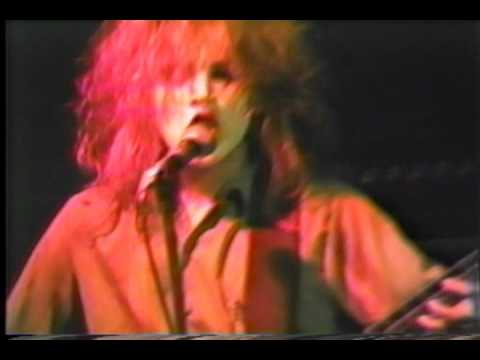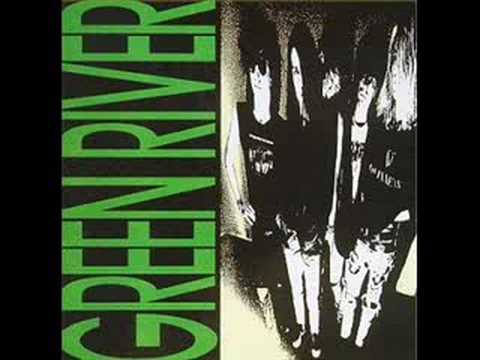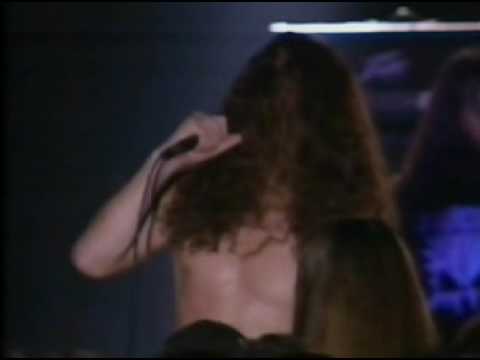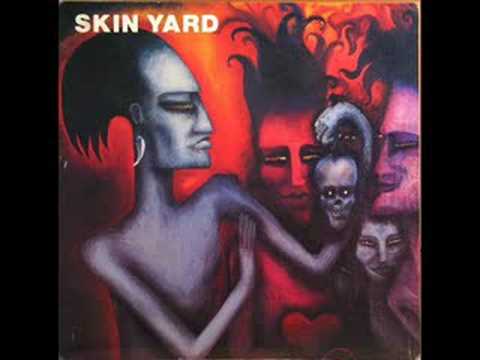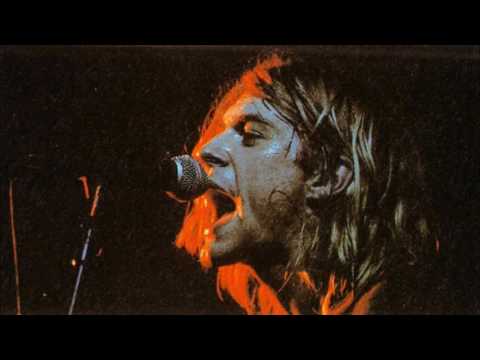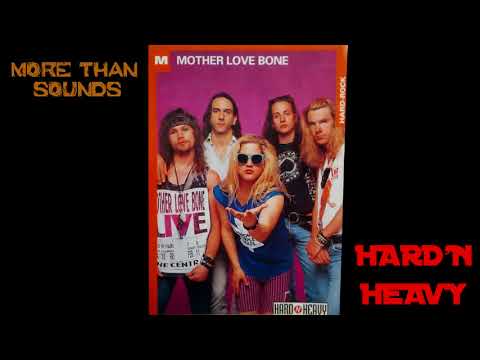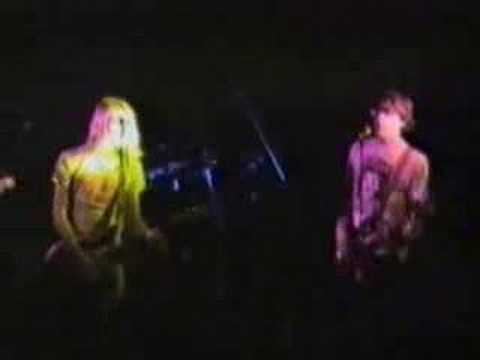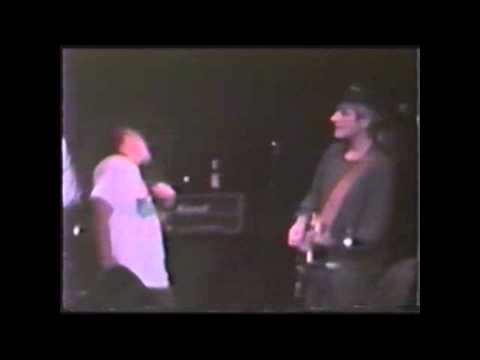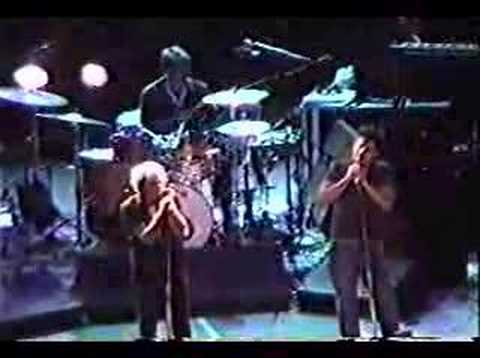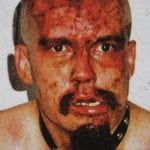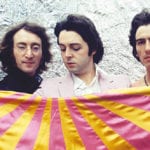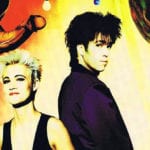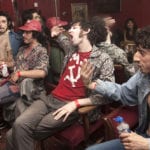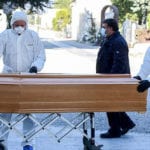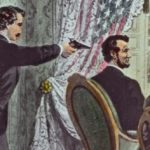Like the other locals mentioned in the intro, this is another early Seattle area band considered to be one of the forbearers of grunge. Though admittedly not a true grunge band, I’m bending my own rule here to give Malfunkshun the opening spot on this list (instead of the Melvins) as a tribute to its founding member, vocalist Andrew Wood, who is an important figure in the history of the genre. Formed by Andrew and his brother Kevin, Malfunkshun was known for their dynamic and psychedelic stage shows. Sporting makeup and a kind of glam style, the band members took on alter-ego stage personas when performing. Though plenty of recorded material and demos do exist, they never did release an album while together; in fact Sub Pop reportedly didn’t want to sign them because they “weren’t grunge enough”. However they did contribute a couple of songs to the 1986 Deep Six compilation album. By 1987, Andrew began jamming and collaborating with several members of the next band on this list, which would lead to much greater things down the road.
Formed in 1984 by vocalist Mark Arm, guitarist Steve Turner, bassist Jeff Ament, and drummer Alex Shumway, Green River is credited as being one of the originators of the sound and in fact is now widely regarded as being the first true grunge band. Guitarists Stone Gossard and Bruce Fairweather joined later (Fairweather replacing the departed Turner). The band contributed two cuts to the Deep Six compilation album, but even before that, in 1985 they released an EP Come on Down on little-known Homestead Records, which many claim as being the first grunge record. It didn’t sell all that well, but their steady gigging in and around Seattle was gaining them in local popularity. Their second EP Dry as a Bone in 1987 gave them the distinction of being the first band to release a record on the Sub Pop label. Later that year, as work commenced on their 1988 debut LP Rehab Doll, the band was beginning to unravel due to differences of opinion on the band’s musical direction. Though never achieving commercial success outside of Seattle, upon disbanding, several of its members went on to form the backbones of later, more successful bands on this list, and achieved worldwide acclaim.
Soundgarden was formed in 1984 by vocalist Chris Cornell, guitarist Kim Thayil, and bassist Hiro Yamamoto (Yamamoto was replaced in 1990 by Ben Shephard). Cornell also originally played drums, however drummer Scott Sundquist joined in 1985 (later replaced by Matt Cameron), allowing Cornell to focus on singing. This was a good thing, as I consider Cornell’s powerful and wide ranging vocals to be among the best set of pipes in rock. His Zeppelin-influenced swagger and style has been favorably compared to that of Robert Plant. Overall, Soundgarden has been described as being one of the more complex in the genre in terms of musicianship and song composition. Signed to Sub Pop in 1987, Soundgarden released a couple of EPs, which drew the attention of other major labels. But in 1988 they chose to release their debut LP Ultramega OK under the production of the lesser-known SST Records. Even so, this album garnered Soundgarden a Grammy nomination. After this success, Soundgarden became the first grunge band to join a major label when they signed with A&M Records in 1989, to release their second album Louder Than Love, which charted to 108 on the Billboard 200. This lead to their breakout mainstream success with the release of the 1991 album Badmotorfinger, which also received much critical aclaim, another Grammy nomination, and went platinum. Their best acheivement came with their follow-up 4th album Superunknown in 1994, which released at number one on the charts, won two Grammys, and was certified five times platinum, earning Soundgarden the distinction of being one of grunge’s “Big Four” supergroups.
Skin Yard is another early pioneer of the grunge movement and probably one of the more under appreciated bands. They contributed two songs to the 1986 Deep Six compilation album as well as several LPs during the course of their run. Although they never achieved mainstream commercial success, they were a big influence on their contemporaries. Founding member and guitarist Jack Endino produced Skin Yard’s debut album, and later became a well-regarded and highly sought-after sound engineer, producing several milestone records for other bands on this list. His “stripped down” recording practices are seen as a defining characteristic of the grunge sound. Drummer Matt Cameron was also a member of Skin Yard, before achieving fame and fortune with the previously mentioned Soundgarden.
Alice In Chains was started when struggling local musicians, vocalist Layne Staley and guitarist Jerry Cantrell hooked up and began working together. Cantrell brought in a couple of his former bandmates in bassist Mike Starr and drummer Sean Kinney, and AIC began gigging around the Seattle club circuit. More of a straight-forward heavy-metal band initially, they were signed by Columbia in 1989 and promoted as such, releasing the 1990 EP We Die Young, which became a minor hit through frequent airplay on metal radio stations. In the summer of that year, the LP Facelift was released, which actually went gold by the end of the year. By the time AIC was ready to release their second LP Dirt in 1992, the Scene was dramatically different, thanks to the meteoric rise of the next band on this list. Achieving platinum status by the end of the year (quadruple platinum to-date), Dirt is arguably AIC’s best effort. It featured five top 30 singles, and garnered several awards, including one for the song Would (a piece dedicated to Andrew Wood) which was included on the movie Singles sound-track.
If this list were ranked in order of “importance”, Nirvana would be the unquestioned number 1, since it was their breakthrough 1991 album Nevermind and single Smells like Teen Spirit that blew the roof off the genre and made them the biggest and most talked-about rock band in America. The magnitude of their unexpected success paved the way to mainstream notoriety for practically every other active band on this list. The most iconic figure of the entire genre is founding member, guitarist and singer Kurt Cobain. Heavily influenced by the local punk and burgeoning grunge scene, Cobain befriended and even roadied occasionally for the Melvins and was a big fan of Mudhoney. Inspired, he joined fellow Melvins fan, bassist Krist Novoselic to start a band. A revolving door of drummers ended when Dave Grohl finally rounded out the trio, but not before Nirvana’s low-budget debut album Bleach was released by Sub Pop in 1989. A rather nondescript record, it might’ve been easily forgotten if not for Nirvana’s later monumental success. Having said that, original pressings of the “iceberg” colored vinyl version of Bleach is the holy grail for Sub Pop collectors, with pristine examples fetching over $1000 today. To this day, Kurt Cobain remains the genre’s most recognizable yet enigmatic and martyred figure.
Mother Love Bone came to be as a result the blossoming musical relationship of Malfunkshun’s Andrew Wood and Green River’s Stone Gossard, Bruce Fairweather, and Jeff Ament (see items 9 & 10). Along with drummer Greg Gilmore (formerly of Ten Minute Warning and Skin Yard), they immediately hit the Seattle club scene. Wood’s talent was undeniable, and his lyrical brilliance and flamboyantly charismatic style as a performer brought much attention to the band. In early 1989 MLB signed with Mercury Records (PolyGram) and released a debut EP Shine, which featured their epic masterpiece Chloe Dancer/Crown of Thorns, a song that also made it onto the Singles film soundtrack. The record sold well and with the band steadily gaining in popularity, later that year they began recording their debut full-length album, to be entitled Apple. This band was poised to break out and make it big, but on March 19,1990, mere days before Apple was set to release, Wood died of a heroin overdose at the age of 24. The album was released posthumously and was well received, but Mother Love Bone was no more and the premature loss of Wood forever changed the course of grunge history.
TAD was founded in 1988 by 300 lb. frontman Tad Doyle and his former Bundle of Hiss bandmate Kurt Danielson. Not pretty-boys by any means, they truly epitomized the look of the Grunge scene: gritty, flannel shirt, torn jeans, and lumberjack boot wearing backwoods hicks. One of their music videos was even banned by MTV because, allegedly, they were deemed “too ugly”. They are one of the early bands signed to Sub Pop, releasing their debut album God’s Balls in 1989 and follow-ups Salt Lick in 1990 and arguably their best musical effort 8-Way Santa in 1991. Typical of TAD’s devil-may-care attitude, that album led to a lawsuit over a questionable cover photo, which they’d found at a garage sale and used without permission. Still, fueled by a growing cult following, they were signed by Warner Bros. subsidiary Giant, released Inhaler in 1993, and embarked on tour as supporting act to Soundgarden. Inexplicably they could not achieve big time success, and coupled with controversy over an ill-advised promotional poster featuring then-President Bill Clinton smoking a joint, Giant dropped them from their ranks. TAD limped along for a few more years, eventually releasing two more albums, but unfortunately never emerged as anything more than an obscure footnote in grunge history.
After the disbanding of Green River in 1988, Mark Arm and Steve Turner bounced around for a bit until getting serious about forming another band. Ex- Bundle of Hiss drummer Dan Peters was recruited, as was Matt Lukin, former bassist for the Melvins, and the group went about recording their debut EP Superfuzz Bigmuff on the Sub Pop label. The record featured the single Touch Me I’m Sick, which is regarded as one of grunge’s all-time classic songs. The tune received lots of college radio airplay, prompting Sub Pop to promote Mudhoney as their flagship band. Ironically, this home-spun media hype earned them greater attention overseas and in 1989 they embarked on a European tour, playing mostly dates in Germany and later in the U.K., as their EP climbed the British charts. Later in the year they released their eponymous LP Mudhoney to moderate success, and Every Good Boy deserves Fudge in 1991. By that time, grunge was a industry phenomenon, but unfortunately for Mudhoney, they weren’t the catalysts, and barely were the beneficiaries of this steadily growing popular musical movement.
Pearl Jam is here at number one only due to chronology, however they are certainly no slouches; along with the afore-mentioned Nirvana, Soundgarden, and Alice In Chains, Pearl Jam is considered to be a member of the “Big Four” of grunge royalty. Formed from the remnants of Mother Love Bone, guitarist Stone Gossard and bassist Jeff Ament recruited local lead guitarist Mike McCreedy to join them, and a San Diego surfer they’d heard about named Eddie Vedder was brought in to sing. The band signed with Epic records and released its debut album Ten in August 1991 (a month before Nirvana’s Nevermind). but album sales didn’t take off until a year later. By the second half of 1992 Ten became a breakthrough success for Pearl Jam, achieving certified gold status, reaching number two on the Billboard charts, and featuring three hit singles. It has since become one of the top selling rock albums ever.
Not intended to be an ”official” band per se, Temple of the Dog was formed in 1990 by the still relatively unknown Chris Cornell of Soundgarden as a tribute to his friend and former room-mate Andrew Wood (see items 5 and 10). Having written a couple of songs in Wood’s memory, Reach Down and Say Hello 2 Heaven, Cornell approached Wood’s former MLB bandmates, the still shocked and grieving Stone Gossard and Jeff Ament, with the intent of recording and releasing the material. These sessions were happening simultaneously with the formation of Pearl Jam, as Mike McCreedy and newcomer Eddie Vedder also joined in the collaboration. Soundgarden (and later Pearl Jam) drummer Matt Cameron rounded out the line-up. The effort produced enough material to fill an album, and in April 1991 Temple of the Dog was released by A&M, to modest sales. That probably would’ve been the end of it had not both Soundgarden and Pearl Jam later achieved major success, which prompted A&M to re-release the album and the single Hunger Strike (a Vedder/Cornell duet). Temple of the Dog became one of the top selling albums of 1992, eventually achieving certified platinum status. Honorable mentions: Screaming Trees (1985 – 2000), Blood Circus (1988 – 1990), Gruntruck (1989 – 1993), Love Battery (1989 – present), My Sister’s Machine (1989 – 1994), Seaweed (1989 – 2000)
